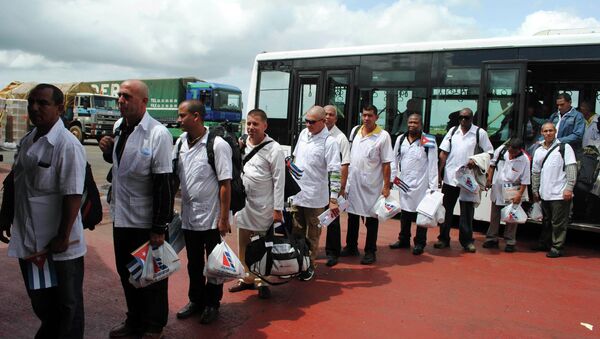MOSCOW, November 6 (RIA Novosti) — In an interesting turn of events, the US media has been heaping praise on Cuba’s response to Ebola lately, and justifiably so. Late last month, a New York Times editorial titled “Cuba’s Impressive Role on Ebola” noted that the tremendous scale of the Cuban response to the Ebola crisis could serve as a means to restoring diplomatic relations with the United States; a Wall Street Journal headline earlier read “Cuban Doctors at the Forefront of Ebola Battle in Africa.” Yesterday, Time Magazine released an article headlined “Why Cuba Is So Good at Fighting Ebola,” pointing out that Cuba is “an unlikely hero in the Ebola outbreak.”
Time praised Cuba, noting that while they’re not “among the wealthiest countries,” the Cubans have been among “the most committed when it comes to deploying doctors to crisis zones,” including hotspots affected by the recent Ebola scare. Time noted that Cuba’s assistance is a political statement which has gained it international goodwill and political capital in the eyes of the world. The country has deployed over 460 doctors and nurses to West Africa to battle the disease, and dozens more are on the way.
The New Yorker noted yesterday in a piece titled “Cuba’s Ebola Diplomacy” that “in a sense,” the rest of the world “is following the lead of Cuba” on Ebola, noting that “no other country, to date, has contributed as many trained health-care professionals to the Ebola crisis as Cuba has.” The magazine noted that over 15,000 medical staff volunteered to go to West Africa to help deal with the disease, out of a sense of pride for their profession. The magazine also called Cuba “something like the world’s first responder to international crises in recent years.” The New Yorker also noted that apart from earning the resource-poor country a bit of money, its medical assistance has also “contributed to the endurance of Cuba’s appeal in the developing world, nearly a quarter century after the collapse of Communism elsewhere.”
Time and others have also pointed out that the island nation has an astounding 50,000 health care workers working in 66 developing countries around the world, and has offered disaster aid and disease management assistance to poor countries for many decades. The country is also home to the Latin American Medical School, founded in 1998, which has offered scholarships for low-income students from around the world who seek a medical education. Over 23,000 physicians have already graduated from the school, with about 10,000 currently enrolled.
Recently, Secretary of State John Kerry has acknowledged that Cuba’s anti-Ebola efforts have been “impressive,” with Cuba’s President Raul Castro noting that “Cuba is willing to work side by side with all nations, including the US, in the fight against Ebola.” The Brookings Institution and others have speculated that the exchange of kind words over the Ebola crisis may be a signal that Washington is edging closer to the idea of lifting its long-standing embargo against Cuba.
This could mean an end to some of the economic strain the country has endured since the collapse of the Soviet Union; in 2012 the average salary was a mere 466 Cuban pesos per month, the equivalent to about US $18, according to Cuba’s National Statistics and Information Bureau. Cubans are able to survive on such salaries due to a rationing and subsidization system which has been in place since the early 1990s.
Fidel Castro said last month in an op-ed in Granma, the Communist Party’s official press organ, that even though he does not expect emnity between the two countries to end over an issue like Ebola, “we will be happy to cooperate with US personnel” for the sake of “World Peace, an objective which can and should be attempted.”



